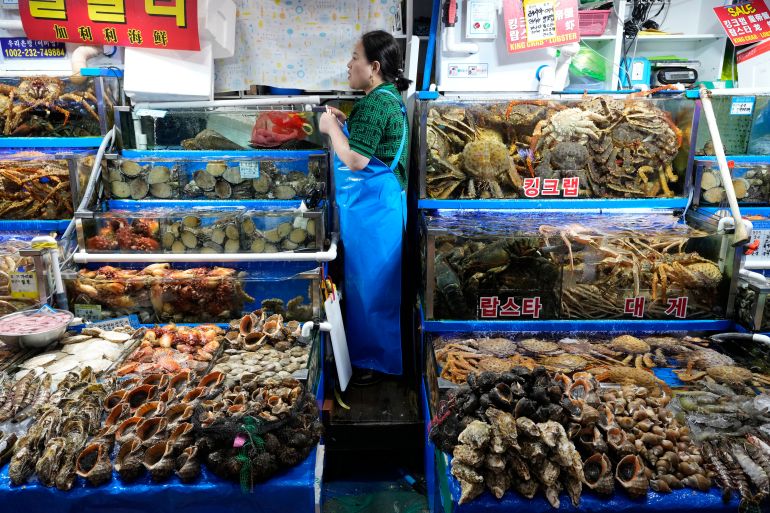Japan says no radioactivity found in Fukushima fish
Tokyo says fish tested in waters around the nuclear plant contained no detectable levels of the radioactive isotope tritium.

Japan’s fisheries agency has said fish tested in waters around the wrecked Fukushima nuclear plant did not contain detectable levels of the radioactive isotope tritium, Kyodo news service reported on Saturday.
Nets were set up on Thursday when plant operator Tokyo Electric Power Company (Tepco) began releasing treated radioactive water into the Pacific, angering fishermen and many others in Japan, alarming consumers in neighbouring countries and prompting China to ban Japanese aquatic products.
Keep reading
list of 3 itemsLeaders of US, South Korea and Japan hail summit as ‘turning point’
Why China is grappling with falling prices – and being compared to Japan
The agency plans to announce test results daily.
Tepco said on Friday seawater near the plant contained less than 10 becquerels of tritium per litre, below its self-imposed limit of 700 becquerels and far below the World Health Organization’s limit of 10,000 becquerels for drinking water.
Tony Hooker, director of the Centre for Radiation Research Education and Innovation at the University of Adelaide, said the water released from the Fukushima plant is safe.
“It certainly is well below the World Health Organization drinking water guidelines,” he said.
“It’s a very political issue of disposing radiation into the sea,” he said. “I understand people’s concerns and that’s because we as scientists have not explained it in a very good way, and we need to do more education.”
Still, some scientists say the long-term effects of the low-level radioactivity that remains in the water needs attention.
Beijing said they will “dynamically adjust relevant regulatory measures as appropriate to prevent the risks of nuclear-contaminated water discharge to the health and food safety of our country.”
Prime Minister Fumio Kishida said Japan asked China to immediately lift these regulatory measures.
“We will keep strongly requesting that the Chinese government firmly carry out a scientific discussion,” Kishida said, pledging to protect the fisheries industry from reputational damage due to the release.
South Korea’s government, which has been trying to improve relations with Japan in order to counter China, has endorsed the water release although some residents are alarmed.
US State Department spokesperson Matthew Miller said Washington “is satisfied with Japan’s safe, transparent, and science-based process”.
After lengthy debate, the Japanese government decided on Tuesday to allow the release of 1.18 million tonnes of treated water from the Fukushima plant, destroyed by a 2011 tsunami, because Tepco was running out of storage space.
The utility filters most radioactive elements out of the water, but it dilutes tritium, an isotope of hydrogen, which is difficult to separate from water.